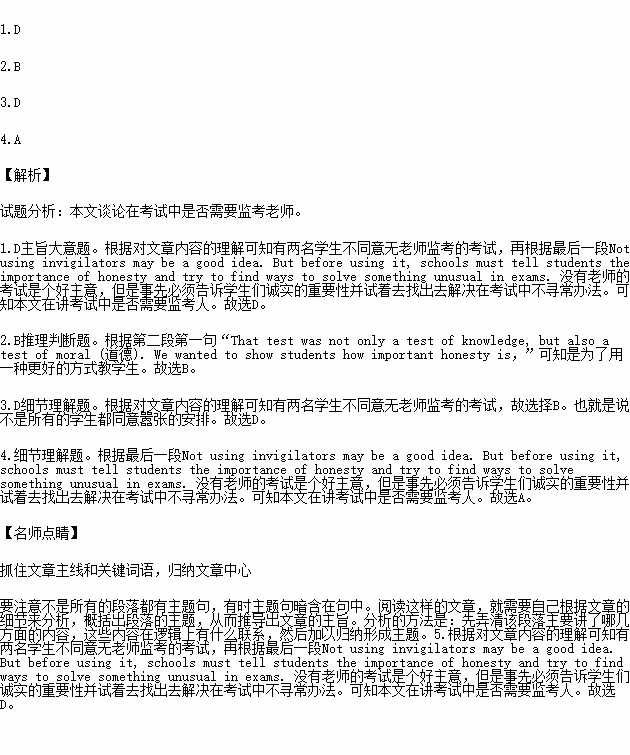题目内容
169 junior 1 students at No. 35 Middle School of Shenyang took their first noteacher exam. After the teacher handed out the exam paper, he left the room and never came back. A student collected the papers when the exam ended.
“That test was not only a test of knowledge, but also a test of moral (道德). We wanted to show students how important honesty is,” said Cai Wenguo, the school's headmaster. The school says no cheating happened in the test. Next year, it wants 80% of its exams to be without teachers. But students have different ideas.
“I was happy and excited during the exam because my teachers trusted me,” said Lang Yudan, a 13yearold girl in Class 11.
“Schools must trust students a lot not to use invigilators (监考人). But I think it is too early. Some students will cheat if there are no invigilators. And the students will not be able to ask for help when needed,” said Hua Sha.
“I don't like having invigilators in exams. When they walk around the classroom, they make me nervous. I would get higher marks without them in the room because I would feel more relaxed,” Liu Qingxi said.
“I think it's very important to have invigilators in exams. Many students want to check their answers with each other after they have finished papers. And they can also keep the classroom in order when something unusual happens. They may make me nervous, but I still think we need them,” Shangguan Yuan said.
Not using invigilators may be a good idea. But before using it, schools must tell students the importance of honesty and try to find ways to solve something unusual in exams.
1.The passage mainly talks about________.
A.how to pass an exam
B.how to make students honest
C.whether there is cheating in exams
D.whether invigilators are needed in exams
2.No. 35 Middle School of Shenyang held a noteacher exam to________.
A.let the students have a good test
B.teach the students in a better way
C.help all the students pass the exam
D.find whether the students were honest
3.From what the students have said, we know________.
A.invigilators really help them a lot
B.all of them think it is a good idea
C.something unusual never happens in exams
D.not all of them agree with the headmaster
4.What does Hua Sha think of noteacher exams?
A.It's a good idea to have noteacher exams but something must be done first.
B.If there are no invigilators, the students will certainly get lower marks.
C.Exams without invigilators will never be held since students are not honest.
D.She thinks it's the best way to show that schools trust their students a lot.
 天天向上一本好卷系列答案
天天向上一本好卷系列答案 小学生10分钟应用题系列答案
小学生10分钟应用题系列答案
